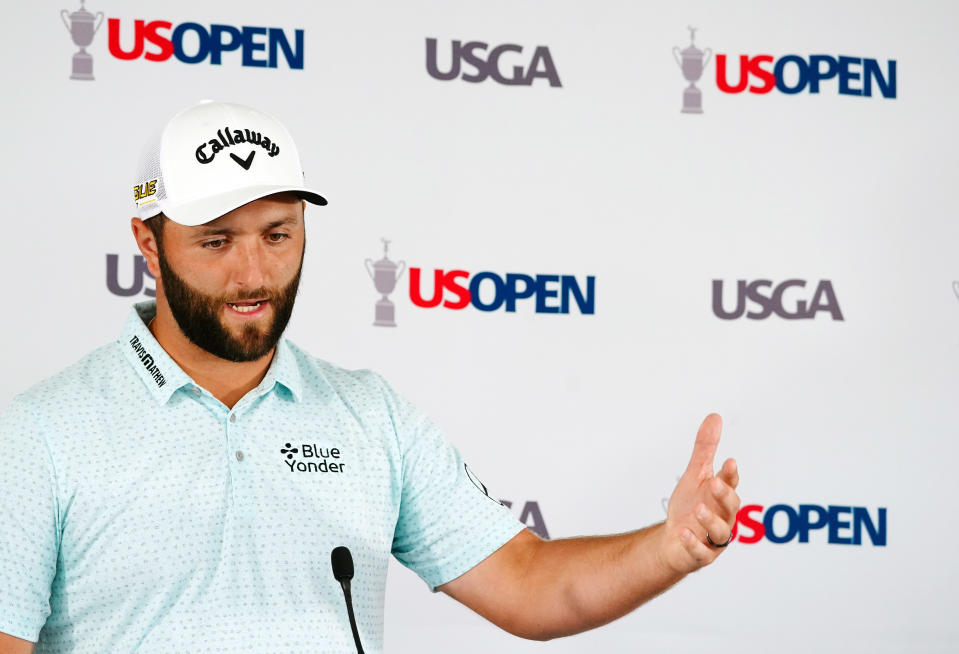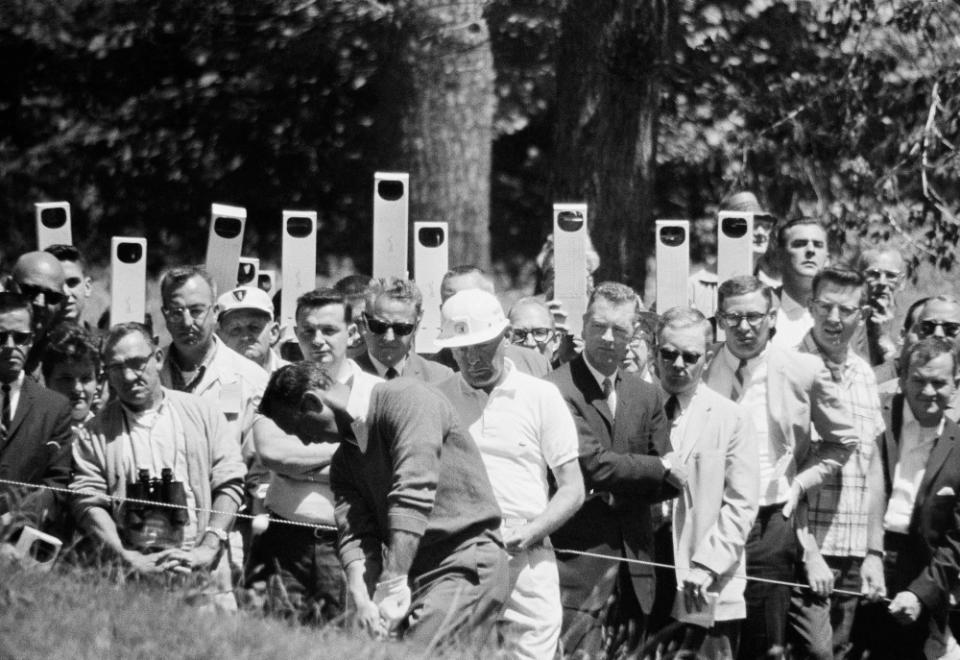Jon Rahm on giving back the U.S. Open trophy, feeling sorry for Jay Monahan, concern for the Ryder Cup and why he’s all in on the PGA Tour

Jon Rahm didn’t enjoy having to ship the U.S. Open trophy back as his year-long custody of the silver double-handled winner’s prize came to an end.
While Rahm noted that he feels less pressure at the majors since capturing the U.S. Open and he desperately wants to defend his title and bring the trophy back home to Scottsdale once again, he spent most of his pre-tournament press conference answering questions about the ongoing conflict between the PGA Tour and the upstart LIV Golf Series.
“I feel for Jay Monahan,” Rahm said of the PGA Tour commissioner in his first response to a question about the renegade circuit. “If you see his time as a commissioner, he had to deal with COVID and now this. I don’t know if he signed up for all this or not.
“I consider the PGA Tour has done an amazing job giving us the best platform for us to perform. I do see the appeal that other people see towards the LIV Golf. I do see some of the – I’ll put this delicately – points or arguments they can make towards why they prefer it. To be honest, part of the (LIV) format is not really appealing to me. Shotgun three days to me is not a golf tournament, no cut. It’s that simple. I want to play against the best in the world in a format that’s been going on for hundreds of years. That’s what I want to see.”
When the question of money was raised, Rahm said he understood why it would appeal to certain players but that it was not a huge selling point for him, and added that he and his wife discussed the matter as the Saudis pitched big-dollar money at golf’s marquee names.
U.S. Open: Tee times | How to watch
“Will our lifestyle change if I got $400 million? No, it will not change one bit,” he said. “Truth be told, I could retire right now with what I’ve made and live a very happy life and not play golf again. So I’ve never really played the game of golf for monetary reasons. I play for the love of the game, and I want to play against the best in the world. I’ve always been interested in history and legacy, and right now the PGA Tour has that.
“There’s meaning when you win the Memorial Championship. There’s meaning when you win Arnold Palmer’s event at Bay Hill. There’s a meaning when you win, LA, Torrey, some of the historic venues. That to me matters a lot, right. After winning this past U.S. Open, only me and Tiger have won at Torrey Pines, and it’s a golf course that we like, making putts on the 18th hole. That’s a memory I’m going to have forever that not many people can say. My heart is with the PGA Tour. That’s all I can say.”
Rahm’s biggest concern is the future of the Ryder Cup, which could be reshaped if players that have defected to LIV Golf are banned from competing.

Jon Rahm addresses the media during a press conference for the U.S. Open golf tournament at The Country Club. Mandatory Credit: John David Mercer-USA TODAY Sports
“I think the Ryder Cup is the biggest attraction the game of golf has to bring new people in,” Rahm said. “I hope we don’t lose the essence and the aspect that the Ryder Cup is. That’s one of my biggest concerns, to be honest. It’s an event we all play for free, and it’s one of our favorite weeks, win or lose. I think that says a lot about the game and where I wish it would be at.”
Those questions may not be answered for quite some time, but by Sunday we should know whether Rahm’s title defense lived up to his expectations. Rahm was in the trophy hunt at the British Open, battled to the finish before coming up just short to Patrick Cantlay for the FedEx Cup crown and won the Mexico Open at Vidanta against a watered-down field on May 1.
“I don’t know if we’ve seen a whole lot from him. He’s played OK, but definitely not Jon Rahm standards. He’s definitely slipped a little bit,” said NBC lead golf analyst Paul Azinger.
But Azinger also learned everything he needed to know about Rahm’s intestinal fortitude in the way he made birdie on the final two holes last year at Torrey Pines to wrest the U.S. Open from a host of competitors vying for the title.
“That tournament was up for grabs. Really any number of tremendous players could have won that tournament. If you go back and look at it, Bryson’s there for a while. Then it looked like Rory McIlroy and then Oosthuizen,” Azinger said. “For Rahm to come out on top and the way he did it under the circumstances with all those great players there, the enormous pressure on Rahm, it was just such a massive step for him as a man and as a player to hole those two putts at the end of the golf tournament. And to put on that kind of short game — which is never his strength — but to put on that kind of short game display there at the U.S. Open and to hold that trophy was a real battle of nerves and will.”
While Rory McIlroy proved at the RBC Canadian Open that defending a national title can be done, Justin Thomas’s playoff victory last month at the PGA Championship extended a streak in which eight different players have won the previous eight major professional golf championships. Brooks Koepka had earlier won four of nine major championships played, including back-to-back U.S. Opens in 2017 and ‘18 in that span and the PGA in 2018 and ’19.
“Usually you go to the same venue, it’s something you’re familiar with,” Rahm said of one of the unique challenges of trying to defend the U.S. Open. “It’s a bit of a weird factor to defend a tournament on a golf course and nobody really has played in almost — since the (1999) Ryder Cup really, right? It’s a little different, but looking forward to it.”
Rahm said the USGA gave him both a highlights video of last year’s triumph as well as a reel that contained all 278 of his shots, and he’s studied it often. If Rahm learned anything from his victory a year ago, it is that golf is not a game of perfect.
“I remember watching my highlights of Sunday last year, and I thought I played one of the best rounds of my life, and I kept thinking, I cannot believe how many fairway bunkers I hit that day, how many greens I missed, and how many putts I missed,” he said. “You know, it’s golf, and that’s how it is. You truly don’t have to play perfect, and that’s I think the best lesson I can take from that.”
List
A look back at the three previous editions of the U.S. Open played at The Country Club in Brookline


